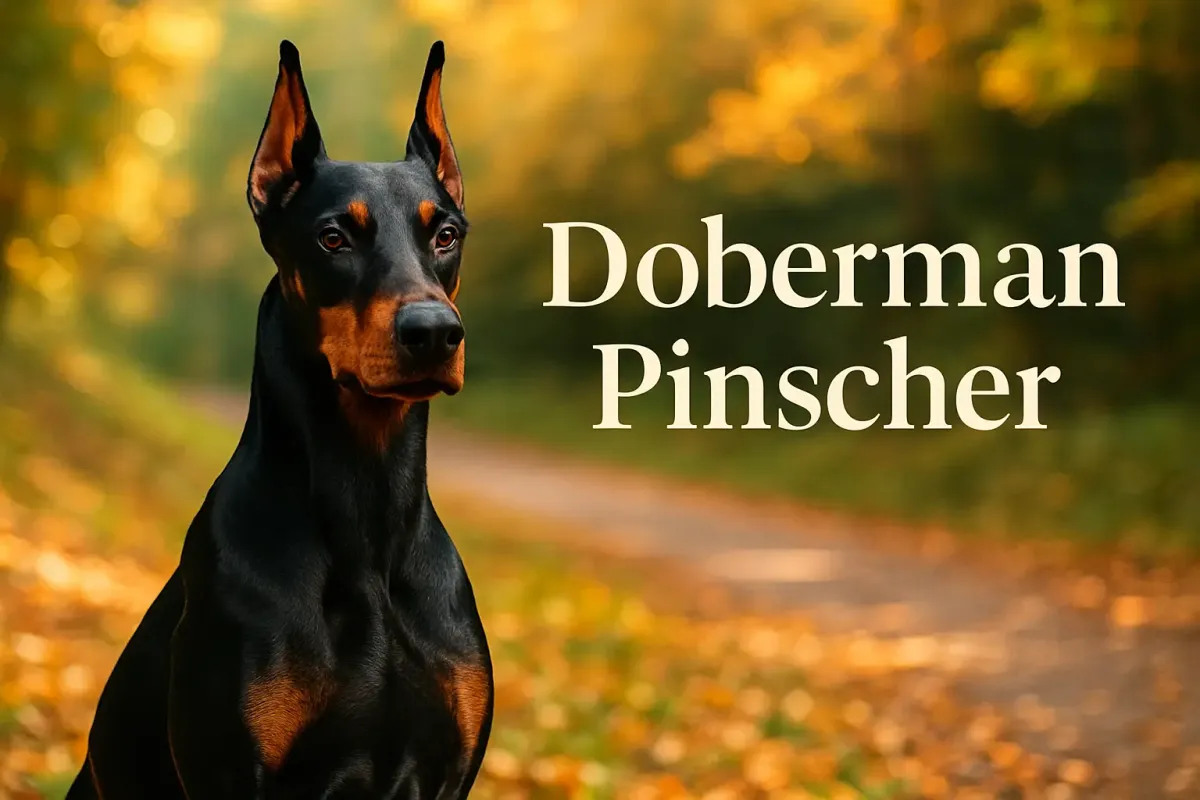Doberman Pinscher: Your Ultimate Guide to This Loyal Breed 🐶

The Doberman Pinscher is a sleek, powerful, and intelligent dog breed, renowned for its loyalty, agility, and striking appearance. Originating in Germany in the late 19th century, the Doberman Pinscher has earned a global reputation as an exceptional guard dog, working dog, and devoted family companion. In India, Doberman Pinschers are increasingly popular for their protective instincts and adaptability to various environments. With their elegant build and alert demeanor, Doberman Pinschers are ideal for experienced owners seeking a loyal and vigilant pet. This comprehensive guide explores everything you need to know about the Doberman Pinscher, from its history and characteristics to care, training, and adoption tips. Whether you’re considering adding a Doberman Pinscher to your home or curious about this noble breed, this guide is your go-to resource. 🌟
For a broader perspective on popular breeds, check out Dog Breeds in India.
History of the Doberman Pinscher 📜
The Doberman Pinscher was developed in Apolda, Germany, around 1890 by Karl Friedrich Louis Dobermann, a tax collector who sought a loyal and protective dog to accompany him on his rounds. By crossing breeds like the Rottweiler, German Pinscher, and Weimaraner, Dobermann created the Doberman Pinscher, a dog that combined strength, intelligence, and agility. The breed was named in his honor after his death.
By the early 20th century, Doberman Pinschers gained prominence as police, military, and guard dogs due to their trainability and courage. In India, Doberman Pinschers are valued for their guarding abilities and loyalty, making them a top choice for families and security roles. Today, Doberman Pinschers are cherished for their versatility and unwavering devotion. 🐕
Characteristics of the Doberman Pinscher 🐾
Doberman Pinschers are instantly recognizable for their sleek, muscular build and alert demeanor. Here’s a closer look at what defines this breed:
Physical Appearance
- Size: Medium to large, standing 26–28 inches tall (males) and 24–26 inches (females).
- Weight: Males weigh 75–100 pounds, females 60–90 pounds.
- Coat: Short, smooth, and glossy, typically in black-and-tan, red-and-tan, blue-and-tan, or fawn-and-tan with rust markings.
- Lifespan: 10–12 years with proper care.
The Doberman Pinscher’s elegant frame, cropped ears (where legal), and docked tail (where permitted) enhance its commanding presence.
Temperament
Doberman Pinschers are known for their intelligent, loyal, and protective personality. Key traits include:
- Protective: Natural guardians, fiercely devoted to their family and home.
- Intelligent: Quick learners, excelling in training and complex tasks.
- Loyal: Form deep bonds with their owners, often wary of strangers.
- Energetic: Thrive on activity and require regular physical and mental stimulation.
These qualities make the Doberman Pinscher a dynamic and devoted companion for experienced owners.
Why Choose a Doberman Pinscher? 🌟
Doberman Pinschers are a unique breed suited for specific lifestyles. Here’s why Doberman Pinschers stand out:
- Elite Guardians: Unmatched in protecting homes and loved ones.
- Highly Trainable: Their intelligence makes them ideal for obedience and working roles.
- Loyal Companions: Offer unwavering devotion to their owners.
- Athletic: Perfect for active owners who enjoy running or training.
Doberman Pinschers are best for confident owners with time to meet their physical and mental needs.
Caring for a Doberman Pinscher 🧼
Owning a Doberman Pinscher requires commitment to their physical and emotional well-being. Here’s a detailed guide to their care:
Diet and Nutrition 🍽️
A balanced diet supports the Doberman Pinscher’s athletic build and energy needs.
- Food Type: High-quality dry kibble or wet food formulated for large breeds. Choose protein-rich options with ingredients like chicken, beef, or fish.
- Portion Size: 3–5 cups of food daily, split into two meals, adjusted for age, weight, and activity level.
- Treats: Use low-calorie treats like carrots or apple slices for training. Avoid human foods like chocolate.
- Hydration: Ensure constant access to fresh water, especially after exercise.
Consult a vet to prevent overfeeding, as Doberman Pinschers can gain weight if not monitored.
Grooming 🛁
The Doberman Pinscher’s short coat is low-maintenance but benefits from regular care.
- Brushing: Brush weekly with a rubber curry brush to remove loose hair and promote shine.
- Bathing: Bathe every 6–8 weeks with a dog-specific shampoo to avoid skin irritation.
- Nail Trimming: Trim nails every 3–4 weeks to prevent discomfort.
- Ear Cleaning: Clean ears weekly to prevent infections, especially if ears are cropped.
- Dental Care: Brush teeth 2–3 times a week to maintain oral health.
Regular grooming keeps your Doberman Pinscher sleek and healthy.
Exercise Needs 🏃♂️
Doberman Pinschers are highly energetic and require 1.5–2 hours of daily exercise to stay fit and content.
- Activities: Long walks, runs, agility training, and fetch are ideal.
- Mental Stimulation: Obedience training, puzzle toys, and scent work engage their sharp minds.
- Socialization: Controlled interactions with other dogs or people enhance their confidence.
A well-exercised Doberman Pinscher is less likely to develop destructive behaviors like chewing or excessive barking.
Training a Doberman Pinscher 📚
Doberman Pinschers are highly intelligent and responsive but require firm, consistent training to channel their energy and instincts.
Basic Commands
Teach commands like sit, stay, come, and heel using positive reinforcement.
- Consistency: Use clear cues and reward with treats or praise to motivate Doberman Pinschers.
- Leadership: Establish yourself as a calm, confident leader to earn their respect.
Socialization
Early socialization is critical to temper the Doberman Pinscher’s protective instincts.
- Puppy Classes: Enroll in group classes to improve manners and exposure to other dogs.
- Controlled Introductions: Gradually introduce them to people, pets, and new environments like parks or markets.
Managing Their Guardian Instincts
Doberman Pinschers are natural protectors, so training must address territorial behavior.
- Leash Training: Teach loose-leash walking to manage their strength.
- Bark Control: Train to reduce excessive barking at strangers or noises.
With experienced handling, Doberman Pinschers can become well-mannered and reliable companions.
Health Concerns for Doberman Pinschers 🩺
Doberman Pinschers are generally healthy but prone to certain conditions. Regular vet checkups are essential.
- Dilated Cardiomyopathy (DCM): A heart condition that can lead to heart failure. Regular heart screenings are recommended.
- Hip Dysplasia: A genetic condition affecting hip joints, causing mobility issues.
- Von Willebrand’s Disease: A blood clotting disorder; genetic testing is advised.
- Bloat (Gastric Torsion): A life-threatening condition. Feed smaller meals and avoid exercise after eating.
- Hypothyroidism: Affects metabolism, causing weight gain and lethargy.
Preventive Care
- Vaccinations: Follow a vet-recommended schedule for core vaccines like rabies and distemper.
- Flea and Tick Control: Use monthly preventives to protect against parasites.
- Spaying/Neutering: Reduces health risks and curbs territorial behaviors.
Proactive care ensures your Doberman Pinscher enjoys a long, healthy life.
Adopting a Doberman Pinscher in India 🏡
Adopting a Doberman Pinscher in India requires careful planning due to their size and protective nature.
Where to Adopt
- Reputable Breeders: Choose breeders registered with the Kennel Club of India (KCI) who provide health clearances.
- Rescue Organizations: Groups like Blue Cross of India or local shelters may have Doberman Pinschers for adoption.
- Pet Shops: Verify the source to avoid puppy mills, which prioritize profit over animal welfare.
Cost of a Doberman Pinscher
- Puppy Price: INR 20,000–50,000 from reputable breeders, depending on pedigree.
- Monthly Expenses: INR 5,000–10,000 for food, grooming, and vet care.
Questions to Ask Breeders
- Are the parents tested for DCM and hip dysplasia?
- Can I see the puppy’s living conditions and meet the parents?
- What vaccinations and deworming have been done?
Adopting a Doberman Pinscher from a trusted source ensures a healthy, well-adjusted pet.
Doberman Pinschers as Family Pets 👨👩👧👦
Doberman Pinschers are loyal and protective, making them excellent family pets for experienced owners.
- With Children: Gentle with family children but require supervision with young kids due to their size and energy.
- With Other Pets: May be dominant; introduce slowly to other dogs or cats.
- In Homes: Thrive in houses with yards but can adapt to apartments with sufficient exercise.
A Doberman Pinscher brings security and devotion to households with confident leadership.
Fun Facts About Doberman Pinschers 🎉
- War Heroes: Doberman Pinschers served as scout and messenger dogs in World War II.
- Hollywood Stars: They’ve appeared in films like The Doberman Gang and Resident Evil.
- Speedy Athletes: Doberman Pinschers can reach speeds of up to 35 mph.
- Elegant Nickname: Often called the “Aristocrat of Dogs” for their sleek appearance.
These facts highlight why Doberman Pinschers are such a respected breed.
FAQs About Doberman Pinschers ❓
Are Doberman Pinschers good for first-time owners?
No, their energy and protective nature require experienced handling.
How much exercise do Doberman Pinschers need?
They need 1.5–2 hours of daily exercise, including walks, runs, and training.
Do Doberman Pinschers shed a lot?
They shed moderately, with weekly brushing keeping it under control.
Are Doberman Pinschers good with kids?
Yes, with family children, but supervision is needed due to their size.
How much does a Doberman Pinscher cost in India?
Puppies cost INR 20,000–50,000, with monthly expenses of INR 5,000–10,000.
What health issues do Doberman Pinschers face?
Common concerns include DCM, hip dysplasia, and bloat. Regular vet care is key.
Conclusion: Why the Doberman Pinscher Is the Perfect Companion ✨
The Doberman Pinscher is a remarkable breed, combining elegance, intelligence, and unwavering loyalty that captivates dog lovers worldwide. From their historical roles as guard dogs to their growing popularity in India, Doberman Pinschers are truly exceptional. By providing proper care, training, and a confident environment, you can ensure your Doberman Pinscher thrives as a devoted companion. Whether you’re adopting a puppy or learning more about this breed, Doberman Pinschers promise a lifetime of loyalty and unforgettable moments. Start your journey with a Doberman Pinscher today and welcome a noble friend who’ll stand by your side! 🐶🌟





